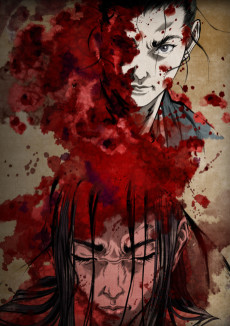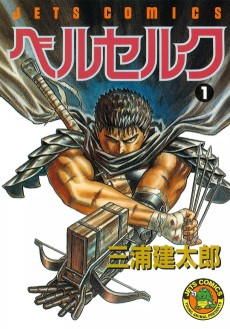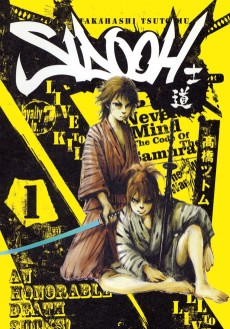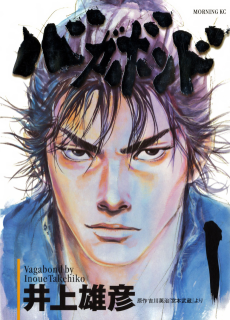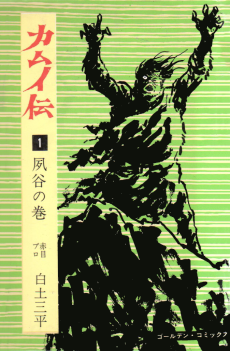SHIGURUI
STATUS
COMPLETE
VOLUMES
15
RELEASE
July 17, 2010
CHAPTERS
84
DESCRIPTION
The story begins in 1629 Shizuoka during Tokugawa Tadanaga's rule. The daimyo staged a tournament where the participants fought with real steel Japanese swords rather than bokken, against his vassals' strong objection. The story revolves around the first match between the one-armed swordsman Fujiki Gennosuke and the blind samurai Irako Seigen and deals with the circumstances that led the two to participate in Tokugawa's tournament.
(Source: Wikipedia)
CAST
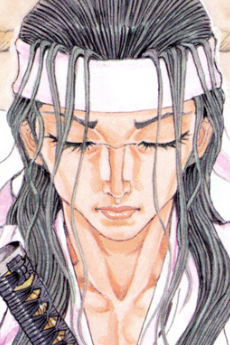
Seigen Irako
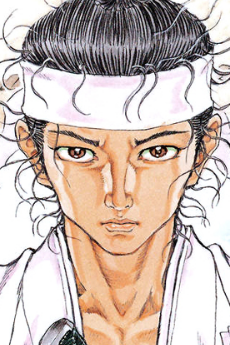
Gennosuke Fujiki
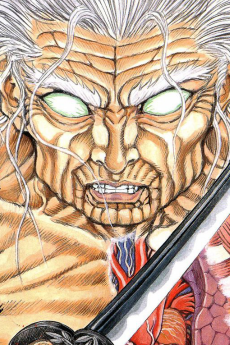
Kogan Iwamoto
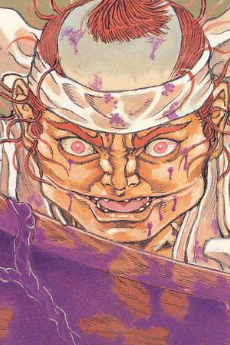
Gonzaemon Ushimata
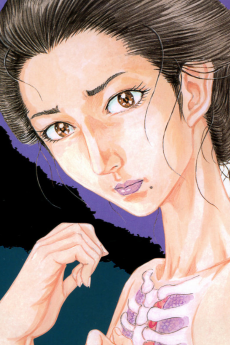
Iku
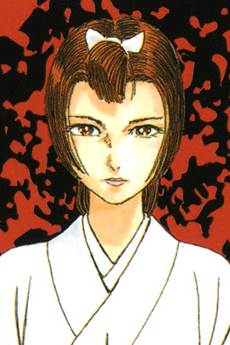
Mie Iwamoto
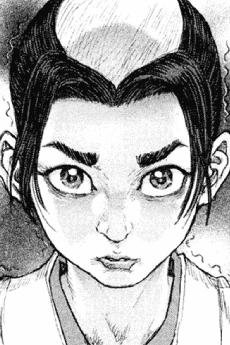
Suzunosuke Kondou
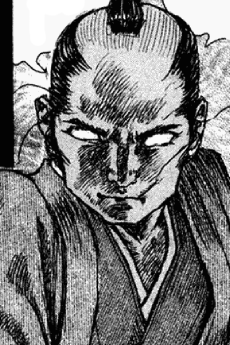
Shinpachirou Munakata
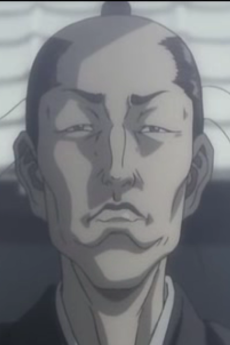
Sanjuurou Okitsu
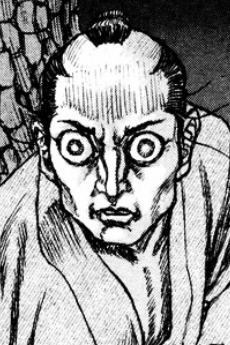
Kurouemon Yamazaki
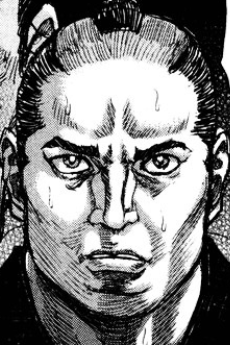
Hikobe Mariko
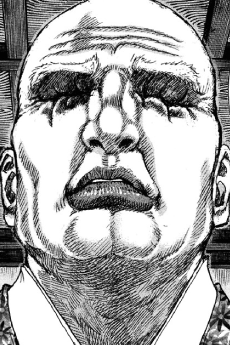
Kengyou Shizuhata

Gannosuke Katsuki
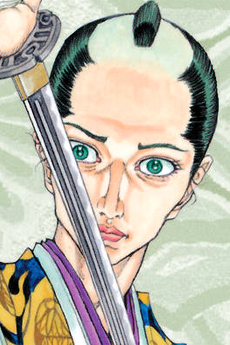
Tadanaga Tokugawa
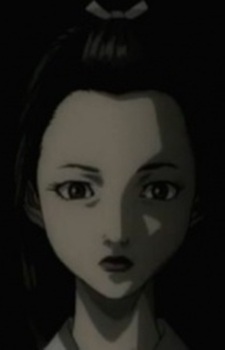
Sato
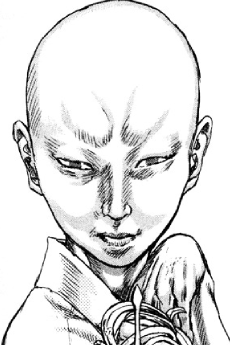
Sekiun
CHAPTERS
RELATED TO SHIGURUI
REVIEWS

ThatsNiche
75/100A compelling and thought-provoking story (almost to a fault)Continue on AniListI should probably start this with saying that this isn't really for people who don't like excessive gore and nudity, because this manga got so weird in some spots like when Gonzaemon ate Iku's nipple or basically any fight scene
I should also add that this is my first try at writing a review so forgive any quality issues. There's also some spoilers at parts I'll specify. I'm also a little stupid so I might have left some uncovered ones, so tread carefully.Okay that aside, I should get into the review. This story covers Fujiki Gennosuke and his rivalry with Irako Seigen, and how they reached the point that they did in the first chapter. It's one of those stories with the "you're probably wondering how I got here", where they reveal the ending at the start then explain how they got there. For example, you know that Fujiki loses his arm and Irako becomes blind because it's in the first chapter, so now the reader is finding out how that happened.
I should start with the art. Long story short, it's good. I can't complain about anything really, except how I had to see an old guy's brains fall out of his face in great detail. It's good, but I would have liked it if it wasn't so good. I like how nobody has ridiculous body proportions or ultra smooth skin. People look like they're supposed to: super buff. You can see the muscles and bones bulging out of everyone, even the girls. I've seen so many manga and anime where the character can blow a football field away in one punch yet they don't have an inch of visible muscle. I won't go as far as to say that there's no fanservice though, because I think almost every character is seen naked at least once. Tits are plentiful, and so are guys wearing nothing but a cloth over their dick. It's equal fanservice, so everyone can enjoy some.
Alrighty now that I have the minor part of this review down, I'll do the plot. It's pretty okay, but imo it really isn't anything special. I'll start with the spoiler-free version. A man named Irako came to a dojo to learn from the master of a powerful technique. After he gets in, because of his talent for learning fast, he starts a rivalry with the top student there, Fujiki, and eventually challenges his position. That's about as far as I can go. Now onto the spoilers one. After he's caught cheating on the master's wife, Iku, Irako is "punished" (beaten to near-death, blinded, and thrown out) and Iku comes with him. Fast forward a couple years, and after a lot of the dojo's members are cut down, Irako and Iku come after luring the two strongest members out and manage to kill the master. Wanting revenge, Fujiki challenges Irako, and in the match Fujiki loses his arm. Gonzaemon takes his place and is killed. I'm probably missing something, but there's what seems to be a completely unrelated side story with this sword girl and a toad guy, so I'm skipping it. Irako is now recognized by Tokugawa Tadanaga, and becomes one of his men. Fujiki and Mie, the master's daughter, get married. A bit later, Irako and Fujiki are both invited to the tournament, where they both go first. Now we're where we started, and Fujiki wins by killing Iku who acted as Irako's eyes, After cutting Irako's head off his corpse, he walks back to see that Mie had killed herself. The end
That was kind of oversimplified, so I'm sorry if I missed anything important, but I think I got the main points. Now the most important part, the characters. I'll be honest, I don't remember most of them, so I'll only do Fujiki, Irako, and Mie.
Fujiki is a puppet of his master, to put it simply. No matter what his master said, be it to hold down a girl so she could be raped or to save a sword even if it costed his life, Fujiki did it. Even when the master died, he still saw him there and did what he thought his master would tell him to do. When he was a kid, his master (I'm referring to him as Kogan from now on because I just remembered his name) took him in and trained his potential, so I guess Fujiki thinks of himself as like a loyal servant. This is pretty important for Mie's character. Even though he's a samurai, he doesn't hesitate to throw away his sword, so he's not a conventional swordsman. Instead of using a sword to the end, Fujiki started pounding the shit out of Irako before he got punished
Irako is the opposite of Fujiki, someone who wasn't influenced by anyone. To Irako, this is a revenge story. I still remember his birth scene from the anime because of how horrific it was. He was born to a prostitute, so he was in the lowest class. He grew up watching the oppression of samurai, so he made his mind to end what he saw as a corrupt hierarchy. Instead of being a puppet to his master, Irako would suck all of the teacher's lessons out then kill him, like how you throw a water bottle away once you're done drinking from it. I used water bottle because some people reuse them, and I guess that helps the analogy. If his master ordered him to do something ridiculous, Irako would refuse or not do it, as shown by when Kogan ordered him to rape Mie and he reasoned that Mie would kill herself if he did. Irako is also uses his looks, seducing people to get what he needs, and that clearly violates the samurai code because he's being sneaky rather than upfront. That's a similarity that both Fujiki and Irako hold. They both aren't afraid to throw away their samurai title.
Mie is probably the most important character I'll cover as she made a very questionable decision at the end, and because of that I'll have to put like this entire thing into spoilers sadly.
Mie hates samurai. She's been around them her entire life, and one is even her father. Her father did some fucked up stuff to her though, like openly saying that she was unwanted and killing animals in front of her. The samurai around her just wanted to get into her pants because of said father. She falls for Irako after he saves her and goes against the grain of a normal samurai. After Iku and Irako leave, she's given to Fujiki. I think she started to fall for him because of the non-samurai things he did. After Fujiki killed Irako, Mie likely saw that Fujiki was not Kogan's puppet anymore because Kogan would probably forbid infighting or something like that. That's shown by the clean shell, which was said to be a symbol for a samurai iirc. The shell wasn't plagued by Kogan's influence, but clean and free. After Fujiki sees a vision of Kogan and cuts Irako's head off because that would have been what he wanted, the shell becomes dirtied again, showing that Mie knew that he still had Kogan inside of him after all. She didn't want to live in a world where she was the wife of a Kogan 2.0, so she killed herself.
Wow that took a while to explain and I had to read the final chapter like 5 times to understand what was happening. I personally dislike these manga that don't tell you the story at face value because I don't like thinking. I watch anime and read manga so I don't have to think hard. Sure some people do like thinking, and if you're one of those people, know that this manga is for you because you get what looks like an open ending at first but it's actually a proper conclusion if you look at it from another angle aka read it 5 times. I may have painted this manga in a good light by writing all of these positives, but actually I didn't think it was that amazing. At one point it just seemed like there were meaningless attempts to make me disgusted, like how they put fallen parts of the body into their mouth or just the amount of gore in general. It was good at first, but if you have 84 chapters of straight tits and guts, you start to get a little tired of it.
I should add this because omitting it is like ignoring a huge chunk of the story and I skipped it earlier when talking about the plot, but there is this little side story in the second half of the manga that covers this muscle chick named Chika and how she grows a dick when she's turned on. It's already weird, but get this: this disgusting toad guy sees himself and Chika being together because they both have this weird deformity. This dude looks like a toad, and half the time he's drawn as one. Because of this infatuation, toad kills all of Chika's suitors, and Chika never gets a good ending because she's summoned to Tadanaga's chambers and gets beaten and probably raped. I have no clue what that story had to do with Fujiki and Irako lmao. All I remember is that the toad guy was also spying on Fujiki and Irako's match. I don't know if this should be in spoilers or not because it's so insignificant. All it really did is try to pull in the male muscle fetishists and it also further proved Tadanaga's brutality, but that was already proven well, so it was kind of pointless imo.
Well, it appears that I have reached the end of this review because I've run out of things to talk about. If I missed anything, whoops.

MitakaFami
100/100No grave shall provide rest for you.Continue on AniListI must admit, I got the motivation to write this piece out of spite of the negative reviews that I came across when I took interest in the judgment of other people, after finishing the manga and the anime. So as to say that here I will provide the points and my thought-process of how all of these so-called flaws of this piece of art actually serve as great and purposeful narrative tools that enhance it with barely any drawbacks. Now I do not intend to imply that no criticism is acceptable, as it completely depends on the reasoning and of course I will not take the negative criticism as an example and just let my point of view to speak for itself to highlight the possibility of readers’ subjective judgment clouding the mind that could have appreciated this masterpiece otherwise (which just so happens to be one of the overarching themes of Shigurui in itself) - both of the perspectives may as well be right on their own
This won’t be a talk primarily focused on either philosophy or psychology, but the characters, environment, and how these affect each other on a personal level, because Shigurui is a character-driven drama with full emphasis on impact (naturally, as the slashes themselves focus just how effective they will be with a single swing) and does not waste its time on coming up with unique concepts, but wants to master already existing and well-known ones... feel free to generalize the character arc, though. While talking, I tend to be laconic and that usually leads to miscommunication, so as to avoid that and plus the self-awareness of me not really being good at writing reviews or writing in general, I will try my best to describe my thought process and to not sound preachy at how art should be judged because I am getting less and less interested in rating things and my scoring system turns more and more fluid.
When authors choose in which setting, fictional or not, they desire their story to take place in, it is always a hard choice to make, as the depicted environment is not only supposed to be allegorical to the present themes but they also affect every other aspect of story-telling, starting from character mannerism and ending to, and also forces an author to research a lot. First, Shigurui's setting has decent enough novelty to at least attract the ones that are interested in the samurai era and gritty at that, so it is crucial for first look impressions. Second, to showcase the investigation and expand on the cultural details, scenes in Shigurui are built around them specifically, to not feel like mere decorations, have some value/weight behind them and stand out from stories with similar environments and gain more novelties. They do not tend to be described by panels focusing on single items, but the whole page may be distributed to them all together to save the page count, feel more atmospheric, and, at the same time, they get a bit of narration through the few sentences that would normally tick my ‘show-don’t-tell’ senses, but I think they fit within Shigurui very well - first, usually info-dumping takes too much time and breaks the immersion, but the way it is used here did the opposite and enhanced my immersion, as the sentences were dictating the flow, just how much attention and time I should have given to the panels. Second, transferring such cultural differences to other languages for other countrymen to experience the story tends to make it hard to fully comprehend it as it's easy for it to get lost in translation, so the approach to explain things but not its subtleties is the correct way to go for Shigurui, the way I see it. Third, characters’ perspectives differ and are clouded by various things, so to subtly state objective truth and to do so not by a character, I believe is a very serviceable contrast to nail the point.
First things first, there is a weird misconception as if Shigurui ended prematurely because we have not seen the rest of the tournament and it is an adaptation of something… it is not really an adaptation in its pure sense, the mangaka just took one chapter from the tournament and built his own story and characters on it, so the rest of the tournament is quite frankly irrelevant as the story starts, focuses and ends by the single rivalry that is Fujiki against Irako.
Now to not make a mistake, the world itself, the old japan, is not presented as something childishly depraved, but the violent nature of the characters merely presents allegorically that the characters are narrow-minded (as their views are completely overshadowed by the dojo itself, that feels like a world to them and feels like a character of its own to us, as it affects others and even has its own reputation that out characters value more than the lives of random worthless people - but little do they know that there is more to the world) and is foreshadowed since the first episodes - the very first scene of Shigurui depicts how did the higher-ups (relatives, even) arrange for the depraved “royal” member to get killed, as his deeds were getting out of control as it was shown in the very next scene to what he himself was arranging. Sure, samurai and their masters are as cold-blooded as it gets, but at least the influential ones are competent and mature at controlling themselves and do not go out of their ways to take pleasure in torturing people - and even the brighter, hopeful side came out in this exact scene, when the samurai offered his own very life a symbol of his commitment to the subject matter of valuing the life of the fellow samurai, by killing himself in front of the master just to make a ‘petition’, which was neglected by the depraved master, but still was successful at the end of the day.
Depraved lord is an interesting character by himself as well. On the first look, I thought he was just another one-dimensional psycho that superficially criticizes the corruption within the feudal system, which it also just so happens to be a done-to-death idea and frankly believed that throughout the whole of my first read. I was wrong, there was a bit more to him and he substantially contributes to the overarching narrative/themes of the series. First, at the start of the series narrator describes the relationship between the samurai and their masters as something similar to a sadomasochistic relationship - this could freely be the warped point-of-view of the Lord himself, considering his detached upbringing and nothing else to do/observe as a result, thus that is the only way of interaction he is capable of (when his plans got foiled, throwing people out from the several stores was his only way of relieving the stress), no one daring to punish him which yet again reinforces to him that he is correct and should be doing such deeds, hence how his perspective was narrow since day one and in what kind of monster the narrow-minded environment resulted. Giving a reality check and providing him of other perspectives by a katana through his neck was the only way of taming such a monster and even then he died with a sadistic facial expression as if he still died day-dreaming in his lenses of depravity and was unaware of what the actual world was, which originated from the feudal system and they were the ones that took the responsibility of their own faults, and even official concealed it, only the legends remain. Second, fabrication of the history is an addition to the facets of perspective as well, as we should not blindly trust the history as there are always things that were concealed or the writer himself was not aware of and we should not take the messages granted from either historical records or every other text, as the credit does not mean much when we do not know by whom were they written and with what intentions and how much of the truth they actually knew - everything about writing is subjective and thus everything should be observed and questioned. From such a government, that is not really full of paragons of virtue, it is easy to believe that things would be fabricated. Third, he is an extreme contrast and a foil to the main characters (his upbringing was full of groceries and influence and too much care that made him spoiled and allowed to get carried away by the spoils), as he was introduced in the story even before them and tends to showcase just how far away are the protagonists from the highs of the shogunate, even if sometimes they get closer to him, they never get close to him, they never get to touch him and they are always below the Lord, as they won’t ever be in any other role towards him (amusingly enough, Lord himself also won’t ever be above the government as in a mature system, there is no such thing as the domination of a single person). Finally, the morality of his actions from his closeted rooms is questioned on the country level anyway, considering him rewarding vagabonds, for example, to show themselves and make use of their own talent for their own good (maybe even to get rid of the shogunate, who would also be a selfish and cold-blooded person anyway, so there would not be much loss, as he would be replaced by a similar person either way), which would also collect them all together instead of seeking and killing them one-by-one in risky situations, but it also breeds the un-ethical example of open depravity and on top of that, allows these “bandits” to rationalize further Lord’s decision and make use it for their own benefit to commit more crime, which breeds more and more conflict and results in even more bloodshed. Not to mention his tastes in unique things, not even flinching an eye once meeting a hermaphrodite.
Thus, his existence is not there to one-dimensionally convey the propaganda that the feudal system is comically evil and you can get rid of it and cure the world just by killing the main boss.
From that, we can derive the fact that the system (sometimes) breeds people with exceptionally twisted mindsets - in any step of hierarchy. A distinction should be made clear, that any system may fall victim to this sort of a flaw and just because the story focuses on psychopaths/sociopaths, does not mean that there are not normal people around or as if normal people are the minority, no, the author just chose to not give them much attention, as they do not tend to be as compelling when compared to the ones that dwell in the abyss and would hinder the narrative as a whole, considering it is centered around the type of people that were abandoned and had no sane people to take care of them and what kind of problems it may lead to, without being preachy about it (cough JOKER cough) and no one really has a pretense of saving the world. Aside from the “no everyone is mentally ill, so the writer is just immature” complain that some may have, there are also people who despise too much violence and deem it as “edgy” (meaning, shallow, I presume) or/and people who can’t relate to characters and somehow are unable to read a story as a result of that. Now I myself am not a fan of the over-the-top violence and general malice in the media that is supposedly excused just because “it is realistic” (as if realism and good writing were the ones and the same) so you have to handle it. No, there is nothing to handle usually in such cases, as the problem is in their portrayal merely being done in poor taste and here I will try to provide an example as to how it should be done in my humble opinion and, at the same time, I will try to explain what makes Shigurui excused to use so much gore.
People do not act evil, whatever they do, they deem it as mere normality, which is what dictates the will of doing and accepting things instead of morality, but our main characters will try to prove it wrong by their presence. It is not about ‘it was like this before’, but more about how it is established as normal in the series itself and it is not about ‘its realistic, thus its well-written’ but more how said realism is well-written in itself - main characters are not victimized by monstrosities of the world, but they themselves act viscerally. The story does not make you desensitized to cruelty in a manner of you being tired by the heavy-handedness of it all, but you just get used to how every single action warrants an impending counter-attack by the reality in a grounded form. So I like it because every action adds and forms the grand scheme of things.
I can confess and admit in this case as well, on my first read, some gory events did seem as if they had no reason to exist and were just making the characters look cool, but as of now I disagree with that mindset and believe that there are barely any meaningless violent actions taken by the characters and the violence itself is just a matter of taste, as it gives a sense of value to the whole ordeal for me and I can’t really comprehend how can people like action series that are no so merciless, what's the point of a character hitting each other then? Even with a mindset of my first read, I find it unreasonable to delve into characters not being paragons of virtue, which is a frequent complaint I hear around. You yourself are a flawed person, so why are you expecting characters with completely different upbringings to be like you, for you to care about the series? Stories are being told to be experienced and to convey a message/moral/lesson, not to be self-inserted - you can do that by your own imagination. So, while reading the stories, I am not interested in certain psyches of the characters (they are supposed to have all sorts of distinct views and traits, anyway), but the events, what is going on, how, why and so on - as soon as it flows naturally and structure has proper emphasize on emotional ‘manipulation’ (for feelings to not mix in each other, to the point of me being confused as what am I supposed to feel exactly), it is fine. You do not need a walking moral compass in a story, because that's what presentation is for in general, it's what dictates what is right and wrong and etc. Shigurui is definitely edgy, but not when the said term is used to define said work as shallow and even if it does not have characters for me to self-insert (it also should not have, because the culture and period are drastically different from mine), it certainly has many other novelties to be carried by.
Sure, the action scenes are over-the-top when compared to other details in the series and it may seem “too cool to be a criticism” for some people, which of course would be fair, but to me, they are not merely exaggerated just like they are in Vagabond for instance, but quite literally impossible to perform anyways, hence why I think it is okay to include, as it literally can’t make anyone repeat similar stuff in real life and so on. On top of that, the limitations of the medium and volume format itself, that number of pages is very limited and you have to make every single page count - so it is quite hard to draw realistic, long scenes of swordsmanship and to compensate on that fact, mangaka should prioritize the impactfulness of the few hits, to which the sword styles in Shigurui fit quite perfectly. Oh and it is quite consistent with it, with no contradictions, so it works perfectly within the set of rules of the work itself, and “b-but it is shonen-like” is not a constructive criticism by no means. Not to mention how they symbolize the theme of weaponizing one’s own shortcomings for something way more profound than merely moping around and doing nothing aside from navel-gazing, as the main characters refuse to accept their unfortunate predicaments, albeit in misguided ways
Talk about injuries, I was quite skeptical when I was getting into Shigurui, thinking - what the hell are these disabled people going to do in an arena from the get-go to make me even slightly invested? Answers arrive quite shortly after when the flashbacks begin. Normally, I would have disliked this type of story-telling, considering how flashbacks negate any tension when you are talking right away that the characters will definitely survive, so there is little to care about in an action series, but here is the time when the injuries are coming handy - characters having so many fatal injuries meant that they could have been cut in any presented action sequence, but you would be guessing just when would that happen and be worried about it because such wounds guarantee the alteration of someone’s life in a drastic manner. This exact aspect is chain-reacted to the weight behind the actions of the characters, considering how much importance is being held by the EACH decision and an act that characters make and how every single present detail contributes to the depth (honestly, this analysis feels like a re-telling because of that and plus how subtle it is while doing them), which I find very realistic, because everything you do and say matters a lot in real life and all of them connects to each other at some point. Also, we can count this as an extreme presentation of the “people do not learn if they are not suffering while learning’ theme, which is frequently used in other works as well, but in these works, characters tend to mop a little and announce as if suffering made it worthwhile, meanwhile not holding many consequences from these very suffering - no, in Shigurui people suffer, make each other suffer and grow out of it together, while their fates get further and further chained to each other like a magnet. All in all, what has been done, cannot be undone and what has been lost, can not be retrieved, meaning that whatever you are doing, will also definitely influence whatever you are going to do later, if someone notices them - just like you can't heal a cut leg, there will always be permanent consequences. This very aspect is what makes Shigurui atmospheric to me, as everything reeks of impactfulness. Especially when demented master Kogan is around, as he is the rule itself and you can expect from him to do unexpected in each of his scenes, that will warrant a mark that will forever stay to the storyline.
And after talking about the gravities of the action, it will be natural to talk about the side characters and a bit of attention that is given to them to enhance the impact further. Now Shigurui’s plotting is tight, focused, and personal from start to finish, so too much attention to the side-characters would most definitely detract from it all - so instead the side-characters are being used not for them themselves to feel like fully fleshed-out human beings, but for them to provide the weight behind the actions of the main character, because that is what it means to be a side-character and criticizing the work just because its side-characters do not feel like main characters themselves is an inherently flawed mindset, in my opinion, and explains how readers with such pretense ‘rate’ the stories according to what it means to be a perfect story in their minds and are not judging the stories with what said stories are trying to accomplish - tl;dr they think it is a flaw to not be what they want it to be. Now sure, other readers use ‘that’s the point’ to justify everything, but that one comes down to the preference, as to how that point should be depicted/portrayed.
These secondary characters always get a bit of characterization once it comes time to deal with them and that may be reasonably counted as lacking in structure, but I think it fits the manga medium. Such moments also help to further foil the main cast - an example being the boy who found himself in the specific, foreign sword as he was being alienated from the samurai culture, but Kogan did not even value the sword as a weapon, but a mere decoration, exactly how he treated said child.
The prominent example of a side-character that’s not used in an episodic fashion is Ushimata - soft and forgiving on the surface, but just like everyone else, he has a demon, a wild beast lurking inside him, the ones are defining him and winning against his opposing idealistic views, as the cynical influence he is getting is telling him that they are getting in the way. But that was not the fault of him getting influenced by someone else, that was him deluding himself, thinking that not only some sort of red cord of destiny exists around the bull, but Kogan knew about it as well? He had to cut the ties… which is another failure, as he starts seeing the girl he killed in other women… It was not Kogan that was killing Iku’s fiancees, but none other than Ushimata and he was also one who gave the ‘advice’ to Iku to ‘save’ Irako (turns out, it was an advice just to continue the sadistic abuse - as he probably reported the slutty deeds of Irako to the relatives of the girls)… in the end he was the crucial part of why conflict was going on. Was the forced act of cutting the ties from the past - liberating? No, it was a mere delusion. His impulses remain intact. Well, in the end none of the characters could run from their past and demons.
But the person should not be judged by their appearance. The bull should stop judging himself by how he appears to others and should not indulge in it, otherwise the one that is not judging him by his appearance - will also be cleaved by him. Neither demons nor angels are real, so if the politeness of Irako is a facade, so can be said about his aura - demons are also merely theatrics. That comes apparent as the blind Irako refuses to believe in what he cannot observe and thus denies Gonzaemon’s whole superstitious existence. The existence that he himself is responsible for creating and no one else. There are no demons lurking inside him, both his softer and wilder sides make him the person he is.
the end of his mind can be interpreted quite simply - he has not killed the kill the girl, but only cut the tree and castrated himself, did as much as it would be just enough for him to lie to himself as if he actually did kill her and the last time we see that girl is the moment she is remembering Ushimata by embracing said tree.
The most infamous examples of side characters at Shigurui are the toad and the hermaphrodite, who is frequently used as the only flaw of this work. To be fair, plot-wise they are loosely connected to the main rivalry, so I could understand the criticism, but I think it still fits - first, it expands on the actions of said rivalry and adds weight, telling us that actions they commit have more than narrow consequences and as the rivalry goes open in the world, they too become lousily, realizing all of these things. Two, they still connect thematically and are being expanded on as the facets - pretty girl soon comes off as hermaphrodite, that disturbs people and thus not knowing how to perceive herself. And the toad that is disturbing to look at, but not only quite talented at swordplay by being innovative, but also keeps perceiving himself as more and more beautiful. Third, initially, I thought their character arcs were left hanging, but that might not be the case - Hermaphrodite later being enslaved to Shogunate as a peculiar plaything. Toad too ends up as the pet for Shogunate and is finally being valued, so as to even get ‘women as food’
Even before the revelations of said complication, female Chika was supposed to replace her male brothers by becoming the only remaining heir and had monstrous strength for a reason. ‘She’ continues to deny her feminine side by indulging in swordsmanship and rebelliousness, but also denies her male body, hence the fear of intimacy. She wants to reap the most benefits but ends up getting one in a reversed manner, valued for being hermaphrodite and serving as a girl.
Both of them likely were killed shortly after.
Before going into the catalyst of the whole tragedy, let’s first talk about the fundamentals of the tale - Kogan and his Dojo. Kogan, as we know, was one violent and ambitious fellow, but after being tricked into believing the rival of his, his prospects towards his ambition died out for good. As a result he fell into dementia and keeps losing his mind whenever he recalls what could have been. He also formed a dojo that is basically his own ‘kingdom’ - he started ‘recruiting’ these with promising prowess but no livelihood, and started nurturing them, so the place not only reeks of his presence, whether he is sane or not, but also reflects his way of thinking AND is taking care of its reputation in a violent manner, considering how he was wronged in life just once when he decided to hide his own dysfunctionality, so the value is deeply ingrained in the dojo and protected with more care than other people, because such people were who wronged him to begin with - thus, whenever someone challenges the dojo, they get deformed as a result, to show off it to the rest of the world. Of course, it bears its own negative consequences for the Dojo itself, as their way of doing things is not very farsighted and everyone will start to shun them and their legacies once they rot away.Irako Seigen enters the scene. Those who fall in battle, would surely wish for vengeance, and would also hope that their legacy lives on in records. BUT once they get wiped out, what do we see? The only thing that has left from them are the legends that glorify the one who killed them, as if he did the job effortlessly, and the demonization of the dojo members, as if they were merely animals. So the disrespectful interpretation is what is left from them and how they will be perceived in the future, instead of their human complexities. But it was not effortless, both psychological and physical scars were inflicted and they do not plan to go anywhere. Celebration is only for those who were detached from the conflict and its hardships.
On the surface, Irako Seigen is a very appealing fellow - He has talent and interesting in arts, as we can see him being respectable at singing and versed at poems. he is compassionate and considerate of everyone, including women that are deemed as objects, coming off as chivalrous in the world of corruption and can construct a relationship with anyone, be it business, inheritance, romance or whatnot. He is a prodigy with a likable demeanor to the point that no matter what he does, his reputation remains intact and everybody wants to fuck him, women and men alike. An amusing example of his facade would be the duel with Fujiki at the arena, once he saw Fujiki suffering and started giggling, but tried to hide it and started calling for help instead.
He has everything that a hero should have, but at the same time, he also has everything that a villain should have. He is not really on the level of being Lucifer (or I have yet to catch details about him), which combines the god and the devil in itself, but he is up there.
Deep down, everything on the surface is a facade and his personality consists of the opposite traits. Irako Seigen is a beast who is very passive-aggressive, which was deeply and naturally cultivated as his defining personality trait in his nature since the days he was born, starting his life in the lowest depths of social hierarchy, considering how poor his mother was on top of being a prostitute, basically having neither pride nor property, in the end losing every bit of her sanity, not being able to recognize her own son. Fortunately or not, he was born with a feminine allure that makes both men and women magnetic towards him and talent, of being able to learn anything in a short amount of time on his own, that could make him worthy of being called a samurai - to question, what was the standard of being a samurai, how could one transform into one from the lowest of status? Hence was born an ambition of his. But there was a fundamental flaw in his ambition, that stemmed from his ‘corrupted’ talent and allure, as he has never used them for things that normally would be counted as deserved, let alone moral, just, kind, selfless or however you could label it in a ‘light’ and hopeful manner, despite him merely trying to survive in a cold world, which oh so required to be hardened to breathe - so it was quite the opposite, his birth was unnatural for a human being, but more akin to that of a beast. There was no one around to educate him on ethics, after all.
Irako also had no one who would come to him and make an heir out of him and delude him into it, which would at least convert him into some immoral being who would at least know his place, where to belong and be ‘civil’ for their standards. But she only had a mother who was incapable of providing him anything material, emotional or whatever any mother fulfills her children’s lives unconditionally. Naturally, Irako is not aware of what unconditional relationship even means, as he lacked the only source and thus everyone would treat him exclusively conditionally. To survive, he started his life with literally stealing others’ properties AND later on had an epiphany that killing is much easier, especially if they are drunk and you both are in the middle of a duel - simultaneously, stealing the way of samurai from that person (from material stealing to… not material). That is an interesting parallel to his arc against Kogan, considering that first he started gradually stealing his identity, whatever was left from the shell of a man named Kogan, what made him Kogan - his art, family, dojo, ultimately all of his properties (including the mistress) and an opportunity towards the future that Kogan has long lost - but after experiencing a miserable failure at every corner of his dojo, Irako also had an epiphany this time… why do not I just kill in a duel all of the members of dojo one-by-one by surprise go towards Kogan as a cherry on a cake, to steal his part of a samurai as well, (un)fortunately.
What makes Irako such a formidable and I daresay scary existence is his persistence full of malice. What makes it highly respectable from my point-of-view is the fact no matter how hard he is being hit and no matter what part of himself (both literally and figuratively) he is going to lose, he will not only will stand back up and continue moving forward, but he will also adapt to his shortcomings and even enhance his way of life as a result of it, basically he will always come up with something, that which would result in something, that he would not have even gotten if he has not lost a certain thing to begin with. He may lose and give up on a path, but he will eternally remain vengeful towards those who wronged him and he will never back down from his goal and just find another path, that would help him at achieving both his life-goal and vengeance, which he did and did it in a quite wonderful manner - he reversed the situation completely. First, he made use of losing the eyes by using the empathy from the other famous samurai who was also a blind samurai and shouldered that one samurai’s dream of being a renowned blind samurai who is also on top of power/talent-hierarchy while being blind, just to feel good/proud because of it (he even invited his own son from afar, to make him look at a guy, to make him understand what he wanted his own son to become, but he turned out the complete opposite of the child, considering the completely opposite upbringing, basically foiling Irako’ fate if he was raised in a rich family). Meaning, that Kogan himself allowed Irako to go on a path of raising above, the path that he oh so wanted, but forever lost the chance, that which then sent him into the demented state - considering the song that Irako sang in front of him, he was well aware of that fact and passive-aggressively snarked about it in a planned-out manner, in a way that only the ones aware of Kogan’s life would get it. Second, he snarled at him, while using Kogan’s object (mistress) in front of him, to bait out the deadly attack from Kogan, which would give Irako a perfect excuse to make him bite the dust. Third, NOW it was Irako who wanted to take an act of revenge, who wanted to teach an old man a lesson, who was making him remember his (it was Kogan himself who reminded himself of his pathetic past by using his own technique) and own past mistakes (as Irako also remembered the women that he slept with and did not care beyond it) and now it was Kogan who was indulging himself in a dream that won’t be achieved and did not want to wake up, who also lost his own eye (a bit more too, but oh well) - ironically, reversed or not, both of these cases equally melted Mie’s psyche.
Did you dare to blind him and made him forever unable to daydream? He will transcend that as well. By being blind, he won’t perceive reality as well, so thus reality will be in whatever he will believe and only he will have a say in that, no one shall be able to prove him wrong and no one shall be trusted. No more intimidation by a bull.
By passive-aggressiveness I did not mean mere snarky remarks, that would be cheap and the concept of having a character whose passive-aggressiveness is conveyed just through them and by being cynical-pessimistic seems insulting to me. To convey this trait subtly, a character needs to be way more deceptive in lashing out the insecurities of theirs and our boy serves as a great example as to how it should be done. The main insecurity, of course, is a coping mechanism from combining both his lowlife status that he won’t ever be able to get rid of, naturally and the prejudice, arrogance and apathy that results in the abuse towards the people of his ‘kind’ from the people that just so happened to be born in the families of the upper steps of the hierarchical system, randomly. Of course this type of backstory does not seem original on its own by any means, as it is easy to recall many characters with a similar archetype - what makes Irako’s case stand out is the effective use of it, through the implementation of nuances, varied character dynamics, development and just how natural it feels compared to his ‘counterparts’.
-Irako wants to turn Kohan into a relic of the past. He observes and deduces all of his doings and means and not only is trying to replicate all of them, but also enhance them further - I thought, at first, that he just cut a cat randomly, but he was actually replicating Konga’s delayed slice technique. Then he went towards Kogan’s mistress to master another technique and the relationship with the mistress itself is also an act done in a similar fashion and he did not just randomly decide to help out the woman. Although that one quickly backfires as Kogan sense’s facade and genuinity of Fujiki and Irako by which of his belongings they ‘treat’.
-Having a child character is a quite common way to symbolize the ‘future’ of a certain thing(s) and the very first thing we see from a child POV of Kogan’s dojo in the present time is how invested he is to the dojo once he starts looking up to Fujiki, although there are complications - first, he was not recruited in a similar manner, so it was basically set in stone that the future of the dojo would stray away from it present path and would likely become similar to the rest of the average samurai ‘schools’. Two, that’s something unheard of Fujiki, he has no idea why he would be admired and in what it will lead to, as he merely lives in the present time. And three, the most importantly, Irako understands all of this - for his revenge, not only he cuts the head of the child first and foremost and then puts his head in the exact post in which he was first scarred by the dojo, to hint that he remembers and he is coming to end them for good
-Fujiki is stoic, sheltering all of his personal impulses, so it gets easier to take advantage of him. Irako is concentrated on people as if he was constantly on the battlefield, surrounded… but Fujiki is always concentrating on himself, to surpass his own limits, improve himself and see oneself - always stuck with his own self in the present time, no care for neither past nor future. Irako hid his petty emotions towards Fujiki and used his observant skills instead, subverting the expectations, by asking him to duel all alone a bit far away, to which Fujiki would agree as he is subconsciously annoyed by Irako’s mere presence and may as well have some superiority-inferiority complex regarding never being able to go above Irako’s talent (and he even confront Fujiki in the previous scene, when they openly admitted malice towards each other by their actions) - but Irako just trolled him, sent a deadly gun to Fujiki and he himself went for Kogan’s head instead, the one who is most precious for Fujiki, but even if Fujiki were to survive, he would be blamed for the misfortune
Irako, the samurai who cannot see, is blinded and Fujiki, the samurai who cannot act, loses his hand - Irako, the one who only sees around as a battlefield, has turned his own body as a battlefield and Fujiki, the one who only looks at himself, it taking care of his own body quite well but loses everything around him.
For someone who shelters all of his impulses, there is also an interpretation that he is a closeted homosexual, but he has no idea what does it mean in that day and age, so gets confused about it - he gets nosebleeds while looking at Irako, is the only man who is enchanted by the feminine look of Irako and even sees him with the womanly breasts out in his mind, whenever he is trying to imagine Irako without the face (as he sees charming Irako with his pure, puppy eyes, in case he imagines Seigen with the face)
Amusingly, Fujiki was also the one who benefited from Irako killing Kogan, which meant that Irako played his part in it and allowed Fujiki to move forward in his life as well, basically doing good for both, him and Kogan’s daughter (confused on her own, as she hated Kogan for how he treated - Irako, at first, did not give much thought to this fact and moved on from his connection to Kogan’s family and a dojo as a whole, but then randomly remembered his interaction with Fujiki in the past, in which there was a very crucial emotional moment of his whole life, considering his upbringing, both in terms of around what kind of people he was being raised and what kind of a human being he was being raised into (as the saying goes, these people who are prejudicial and suspicious of others by viewing them as “evil”, “untrustworthy” and so on, are “evil” and full of malice by themselves and that’s the source of such thoughts - fitting to Irako’s description) meaning that both of these reasons add up to each other to form the thick shell and as a result he is always on guard and never opens up. Hence the importance of this scene, in which Irako got attached to students around, as his empathy kicked in and imagined how their lives must have been similar to his and he let his guard/shell down, as its natural to do for someone who never knew the softness of the life and was starting to get spoiled by it, especially how no one blamed each other and no one held anyone (even him, newcomer) under suspicion, as a result of Fujiki’s almost fatal failure, that was anything but how samurais were acting in Irako’s perspective and the most importantly, they too were victims of samurai mentality themselves as well- Irako did not even kill the rival with the most potential to secure the position, but instead saved his life from a situation that could get rid of him the rival with no consequences to reap - but that was only wishful thinking, as the reality woke him up shortly after, when the students saw a turtle, merely expelling excess salt for its eyes. Students’ lack of information regarding how the world is built and how close-minded they their perspectives are naturally forced out the empathy out of them, because the only thing that could explain what was happening in front of them was - imagination through the personal bias, as they made a parallel of their personal lives to that of a turtle and its children, thus representation as to what clouded their world-view was provided. That was the only thing that made Irako different from them, in his mind, as he did not have his own place to belong to, so he was wandering around the beach, instead of being treated by a parent turtle with kindness. So, what encouraged him to open up and to settle at the dojo as if it was his home to belong to, was the main individual similarity that he noticed in Fujiki - “he is the one that does not speak about his past, so he what if he is also ashamed of his past and the two of us are the one and the same?”. And after revealing what made Irako motivated towards his path… Fujiki does not care? But instead embraces himself as a samurai and looks down on Irako, as he cares more about the house than the attachments he could make with actual living beings?! Irako got ashamed of making the mistake of opening up and then cut both, the attachments that were made naturally (by nature, a wind) as the markings on the beach representing how everything was connected in a place in which he did not belong and he also cut the children of the turtle - that act as a whole representing how Irako refused to immerse himself in the status quo and instead had an urge to obliterate it now, completely denying the empathy towards them.
Previously, in that very scene, we saw Fujiki drowning in an old armor of a samurai - representing Fujiki’s shell that he made up in his own mind, meanwhile neglecting his past self (highlight at the start of the duel against Irako, when he ignored his blood relative as if he did not even exist in Fujiki’s world) to the point of not being able to recall it anymore as his own self and got deluded as a result. Of course, the armor belongs to Kogan, meaning that he is narrow-mindedly focused solely on the dojo and not looking beyond it - connecting to Fujiki’s past, when he was saved and manipulated by Kogan (presented as a tiger in the flashback, because everyone views him as someone larger-than-life or/and some sort of a beast) to take the child to him and make a student/servant out of him, maybe even someone worthy enough to inherit his property. That dream-like escalation of events would birth a delusion of grandeur in anyone, let alone a little Fujiki. His past self is drowning while diving deeper and deeper to the point of his past self not being able to free himself as he is chained to the family - Irako being the only one who is able to dive as deep as he is, as they are similarly too deep into their own shells, places the fundament and highlights how he is the only one able to save Fujiki from his own self, but unfortunately that did not happen right now. In short, Irako's shell originated from him being aware of self and surrounding environment, but Fujiki's from the opposite - unawareness of both.
He deeply buried that very moment in the memory, to the point of only his emotions remembered it, even when Irako was amidst the lusty woman, he was trying to figure out the puzzle that was his emotions, conveying how hurt Irako left after the dialogue with him and Fujiki - so, Irako did not just help some random student get hands on Kogan’s family properties, but Irako, with his own hands, staged the inevitable destiny for Fujiki, the one student of Kogan who was deluding himself into thinking that he was actually born as a samurai, the same people that were looking down Irako for his whole life and the people that Irako was going against whole-heartedly, meaning that… maybe Fujiki was actually birth as someone inherently superior to him, despite him not being as talented as Irako? Irako Seigen HAD to prove otherwise and correct the superstition with his very hands. On his way out, he even killed a samurai who merely just felt pity towards him, as he now got looked down even more, for what the certain one dojo inflicted on his eyes, casually adding another layer to his annoyance by Fujiki’s existence. He was more than ready to slice Fujiki in half.
At the end of the day, Irako was still looked down
His dynamic with Lady Iku kickstarted with him wanting to steal something from the head of the family with the tricks that he observed and learned from the head of the family himself - but then it snowballed (pun intended, as he was playing with snowballs before off-in his own mother) into something more meaningful once Seigen lost the eyes and was ‘rebirthed’ and he was now breed by Iku in a symbolic manner, as she gave in to her subconscious motherly bond, that she was trying to deny before, merely wanting to be Irako’s girlfriend - so Irako and Iku started complementing each other’s lives henceforth - Irako not using her as a tool and Iku genuinely trying to be as helpful to him as possible because they do not have anyone else to rely on. Irako probably did not want to recognize her as a mother and started running away, considering that would remind him of his biological mother and how he killed her with his own very hands.
In contrast to Mie (who is being a selfish romantic and constantly wants the world to indulge in her escapist fantasies. As if only care in her world for her is to stay pure and there is no need to do anything - but then again, it is not really her fault, she could not really see any other options in that dojo and would have been traumatized by action and reactions of her parents), she is not selfish and does things on her own, helping out Irako unconditionally even when he is afraid of intimacy towards her. Amidst so many delusions of grandeur, we had only Iko who thought low of herself and had grounded desires - was doing everything she could and even to highlight how grounded she is, she was the only one who was looking at Irako’s ground and cleaning it up to not endanger him further. Not to say that Mie would not have been a kind and considerate woman in normal circumstances. But of course, Mie, just like everyone else, is not without her own faults as well - for instance, committing adultery and lying about it. And Mie also has traits that are worth admiring, as she is still trying her best to live, even walking daily for hours to just maybe if she would be able to find someone who would treat her like a normal human being and sell the food, at the very least. But, in the end, both of them still end up killing themselves, as their final straws of hope die out. After all, Mie’s feelings are more complicated than her being a mere romantic - she does not forgive Irako for not caring about her, but her romantic views of him are still nostalgic, melted in her and every time she thinks of Irako, its Irako with loving eyes, that she is trying to run away from, trying to uphold her rationality of wanting to kill the man. On the other hand, her romantic lenses give her hope regarding Fujiki and start genuinely liking him, but emotionally she still remembers how she was treated at the dojo and hates Fujiki because of it, while being self-unaware - blurring the line between the love and hate regarding both Fujiki and Irako, just towards which are these feelings are aimed at: ‘kill him, please’ no one, including herself, knows the aim of these words of her. We even get a glimpse at how the strict nature of Kogan dwells in her and for someone who was treated as a tool, being controlled, we see her urges to compensate on that by being the one who is in control now - according to her escapism she does not want Fujiki (or Irako… any savior will do) to be a puppet... but wants to be the puppeteer by herself
After living through so many hardships, Irako found a ‘suitable’ himself to ‘steal’ by achieving the inheritance by his sheer talent and investment of a good amount of time. Needless to say, a man so full of talent easily found his footing at this place and despite the cold and very dangerous welcome, everything started to flow exactly how he wanted his life to escalate and as observant as he is, there was no thing that could get on his way and ruin his path, as he managed to handle every aspect of the dojo well with relative ease (being stronger and more worthy than the other students, being rationally cherishing of the property to please Kogan, having an individuality by not being a puppet to please Kogan’s daughter and generally having a good reputation around the dojo). He got laid-back naturally, as his way to the top was getting patterned, was getting turned into a daily routine and he now had to take care of the only thing take could potentially ruin his image of a samurai and what could hold back him from stealing the identity was - his past, represented by his mother, who was being treated and cherished by Irako for a long time now, as she was incapable of doing so herself. Indicating that he liked her mother and helped her on his own accord, of course and what makes this ordeal melancholic is the fact that not only that his own past (mom) could not recognize what he has become, but him killing her may as well be better for her and negatively affect the psyche of the perpetrator, as he was basically getting rid of the only real attachment and only real identity he has had, which would break any real person - he needed to seek something that would comfort him and as he had no one to do so to him, he started living in a dream, as a means to coping with killing a mother, he needed to know that all was not for nothing. In short, extremely cautious, fake, cold and observant Irako was reduced to a mere softie (a fatal flaw) who was already day-dreaming and prematurely living in a dream, as he put eyes on a snowman, the very eyes that started bleeding instantly after he killed her mother, foreshadowing Irako’s crippling demise (of his eyes, as he himself will be reborn). Little did he know that Fujiki secretly improved himself thanks to the injury that Irako himself inflicted and that Kogan noticed Irako’s mischievous deeds through Iku attempting to kill Kogan and also the aroma from her nipple. He was so deeply immersed in his and what would count as “normal” by the standards of the dojo that he has been inhabiting, that he was unable to wake up from even after Kogan allowed to mutilate his body several times in a row and even after taking a direct loss against Fujiki. He still believed that he was about to learn the “sacred” technique. His eyes had to be cut, for him to step out of his well of the dream - symbolizing that his perception would never be influenced by foolish lenses of imagination ever again. He would be blinded not by the dreams going above in clouds, but by the deep down dwelling emotions alone from here on - as can be seen how he started despising even soulless objects, just because of speck resemblance to the ones that wronged him. That is to say, that he did not massacre the Dojo because he was blinded by his ambitions - after all he was already a samurai, when he started to kill the members so they were not really in his way, although it could be speculated it was one of the requirements from his master.
Another thing that could be derived from the flashback of his first kill, that of him killing a drunk samurai, is how Irako seemingly absorbs the fates of the ones he kills, as if he becomes destined to experience that has happened to his opponents in a manner of ‘poetic’ karma. This notion could be connected to the folk-tale along the road, when Irako and Fujiki co-operated for the first time and before going into the battle, they started to pray next to the rock, the area from which that tale has originated - the tale was about a demon who went into a human being and started operating him. The reason they started praying was not for the woman that got killed by a “demon”, but for them to ‘absorb’ demons and transcend humanity, so hence begins their intertwined tragic fate, which also gives as to think about the possibility of acquiring someone else’s curse - I myself would not call it ‘karmic justice”, cause there is barely any justice in the worlds of Shigurui’s characters, but I guess it could be asserted in that way as well. Basically, along with stealing the identities, he was also inheriting their fates. As well as expanding on the 'fairy tale' aspect of its themes, elaborating on how all of these 'occultic' stories out there are actually just to mask the cruelties of human nature, as people stop recognizing such negative tendencies as humans, representing them as inhumane, demon beings, deriving the impulses from the human nature.
After the initial fight, manga suddenly manages to somehow up the levels of intensity even higher by transforming into some sort of a thriller/horror… will the fate of Kogan (as he is in Kogan’s role right now, back then when Kogan died) repeat or will Irako be able to reverse the flow (sakanagare) of his destiny further?
After the duel of vengeance starts the expansion of the world view of the main characters. In a drama you would expect from a story to start in a light-hearted manner and then descend into darkness from the ground. Shigurui reverses the structure and ascends the character from the darkness to the ground. I personally dislike gloomy series that forcefully end in a hopeful manner, so I had quite a blast. The difference in Shigurui’s case is that even then it does not go on the route of romanticization, it just shows how more polished the world is at corruption. There is more freedom to actually live your life, but at the same time, you might have your heart pierced by a smiling spearman in front of you, for their own agenda that you have no awareness of whatsoever.
Fujiki faces reality and admits that he is no match to Irako. That makes complete sense, but at first completely unheard of, considering the expectations the story builds. Despite that, of course, trauma still remains and results in his impulsive behaviour once he hears or sees anything related to Irako Seigen. Irako, on the other hand, keeps going on the path of Kogan and almost ruins his whole career by his own mannerism, just like Kogan did in front of the shogunate. Although Irako still manages to dodge the bullet because of how clever he is with words. And his trauma also remains, but it does not show itself as some destructive impulse, but as the guilt that shows itself in the form of empathy, as Irako Seigen goes out of his way to help out the children who literally have nothing, that remind him of himself and his own mother. It also is a reason he can’t really get close to the people, even with whom he gets intimate and are not even samurai, because even then they won’t approve of his past - just like in the past, before he became samurai. Precisely the reason he would be defeated in the final battle - Irako has no flames burning inside of him aside of aimless ambition, while Fujiki has a path of burning love that is crystal clear.
But at least Irako knows that he and everyone else are one and the same, human beings and he is not above others just because of his status. Being informed of Fujiki’s past, he was indirectly brought back to the ground, down-to-earth and emotionally remembered that there was always way more to his life than a mere ambition. Fujiki, too, understood the essence of his arch-enemy, hence the sincere battle to the death can commence, as both of them started to respect one another. Thus both of the main characters are free from the claws of the samurai world before their duel. And another thing that's being established is some sort of a romantic fate of a couple, saying that they will most definitely be united together and the fight will be the one doing it - who these words are aimed at, is still being blurred, because the fight will also unite Irako and Fujiki and so on.
But the demons and their swords are still lurking around. Hence the fate that got intertwined by the finger lock, gets freed by the very same technique. Thus Irako has been released from his guilt of killing the mother and might have met her in the after all, as the Fujiki wanted to respect the dead rival, while remembering all of the scenes of Irako’s vulnerability and attempts at connection, that he had never noticed, but alas it was too late… demons had the other plans, as the samurai world keeps stripping the people off of their identities and want to pull the strings behind the puppet that will be Fujiki, thus the demons lurking within Mie stepped back in as well. As Iku killed herself with, there was no transcendence from concerns that were left around, hence the awakening of Fujiki with his long-forgotten identity. Fujiki was not a natural-born samurai after all… but a mere tool in his whole life. He gave in and he has been broken, not being able to muster no more strength than a baby. In the delirium state, there was nothing left for him but to forcefully revert back to his child state, that of delusion, considering he had only left the pledge with the maiden and the future of Kogan’s dojo… but there was no Mie anymore. Nothing left to be loyal to… what would have happened to Fujiki if not to be thrown in the demented state similar to Kogan’s, eternally remembering the pledge?
The match that was recorded as just another ‘heroic’ duel in the annals of history and in the legends, was actually full of unspoken complications and anything but heroic, but the struggle to restore the lost dignity of the oppressed
On the surface, Shigurui is about the samurai having a feud with each other. Beneath the surface, it is about the people being pitted against each other by the samurai system, for the benefits for the said system - and the final blow is dealt by the shogun, yet again enslaving those beneath the hierarchy, by asking Fujiki to go against himself and strip off the pride of Irako (the only thing that has left of him in the annals of the history of his true self), the one Fujiki learned to respect. At the end realizing that those below them are merely distracted by competing with each other, but… it's too late now, as he himself has nothing left of his true self as well and has become just another tool of feudal japan. Did you get disappointed by not being able to see the rest of the tournament? Well hello, you have missed the point and you too are getting distracted.
SIMILAR MANGAS YOU MAY LIKE
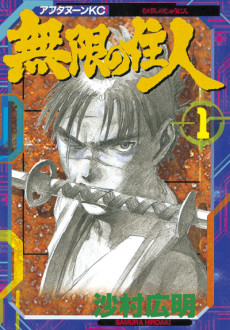 MANGA ActionMugen no Juunin
MANGA ActionMugen no Juunin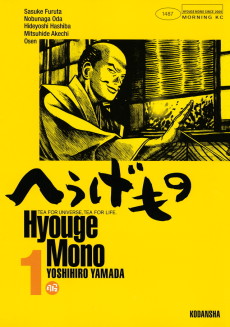 MANGA ComedyHyouge Mono
MANGA ComedyHyouge Mono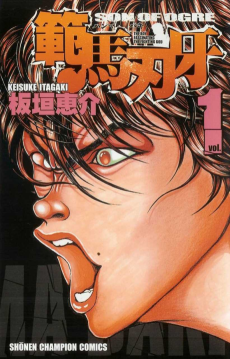 MANGA ActionHanma Baki
MANGA ActionHanma Baki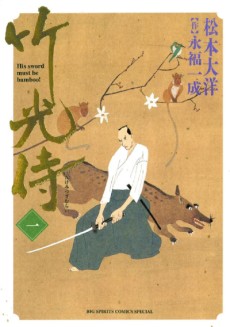 MANGA DramaTakemitsu Zamurai
MANGA DramaTakemitsu Zamurai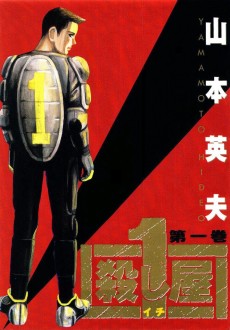 MANGA ActionKoroshiya 1
MANGA ActionKoroshiya 1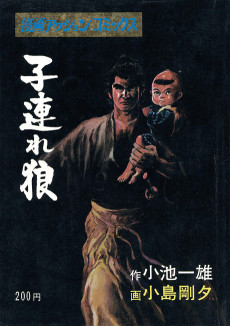 MANGA ActionKozure Ookami
MANGA ActionKozure Ookami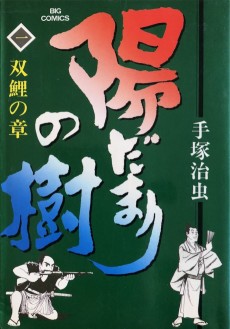 MANGA DramaHidamari no Ki
MANGA DramaHidamari no Ki
SCORE
- (3.85/5)
MORE INFO
Ended inJuly 17, 2010
Favorited by 351 Users


